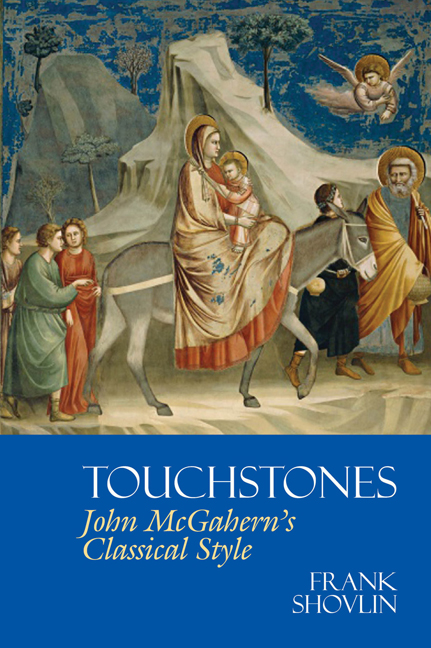Book contents
- Frontmatter
- Dedication
- Epigraph
- Contents
- Acknowledgements
- Touching Stones: Matthew Arnold and the Canon
- 1 We Other Clerks: James Joyce and the Classical Temper
- 2 A Walking Mirror: Stendhal, Horace, Nietzsche
- 3 One Lone Paperback: Tolstoy and Religious Sensibility
- 4 Magic: The Centrality of W. B. Yeats
- 5 Instinct: Douglas Stewart and Sex
- 6 The Fume of Muscatel: Yeats's Ghosts
- 7 Bohemian Rhapsody: Patrick Kavanagh and Generation X
- 8 Absurdity: Camus Comes to Clones
- 9 Aristocracy: Andrew Marvell, W. B. Yeats and the Curse of Cromwell
- 10 The Consolations of Nothingness: William Blake, W. B. Yeats and Prayer
- 11 Deliberate Happiness: W. B. Yeats and the Inner Life
- 12 Stranger in Paradise: Dante and Epic Style
- Conclusion: What Then?
- Bibliography
- Index
10 - The Consolations of Nothingness: William Blake, W. B. Yeats and Prayer
from Touching Stones: Matthew Arnold and the Canon
- Frontmatter
- Dedication
- Epigraph
- Contents
- Acknowledgements
- Touching Stones: Matthew Arnold and the Canon
- 1 We Other Clerks: James Joyce and the Classical Temper
- 2 A Walking Mirror: Stendhal, Horace, Nietzsche
- 3 One Lone Paperback: Tolstoy and Religious Sensibility
- 4 Magic: The Centrality of W. B. Yeats
- 5 Instinct: Douglas Stewart and Sex
- 6 The Fume of Muscatel: Yeats's Ghosts
- 7 Bohemian Rhapsody: Patrick Kavanagh and Generation X
- 8 Absurdity: Camus Comes to Clones
- 9 Aristocracy: Andrew Marvell, W. B. Yeats and the Curse of Cromwell
- 10 The Consolations of Nothingness: William Blake, W. B. Yeats and Prayer
- 11 Deliberate Happiness: W. B. Yeats and the Inner Life
- 12 Stranger in Paradise: Dante and Epic Style
- Conclusion: What Then?
- Bibliography
- Index
Summary
PAUL RUTTLEDGE. We must destroy the World; we must destroy everything that has Law and Number, for where there is nothing, there is God.
W. B. Y eats, Where There is NothingDenis Donoghue was not the first commentator, nor will he be the last, to notice that ‘That They May Face the Rising Sun is hardly a novel at all.’ ‘There is no story,’ he explains, ‘no plot, but a series of vignettes. […] Nothing happens except talk, bits of news, gossip, reminiscence’. It is the closest that any of McGahern's published fiction comes to fulfilling a fantasy of his literary hero Gustave Flaubert who dreamed of writing such a book:
what I would like to create is a book about nothing, a book without external attachments held aloft by the internal force of its style, as the earth stays aloft on its own, a book that would have almost no subject or at least in which the subject would, if possible, evaporate. The most beautiful works are those that have the least matter; the closer expression hugs thought, the more words cleave to it and disappear, the more beautiful it is. Therein lies the future of Art.
While Flaubert never quite realized his dream, McGahern comes very close, in this late masterpiece, to writing the ideal book with nothing at its core.
‘The life where nothing happens’, confessed McGahern in a television documentary made late in his life, ‘is to me the most precious life’. For McGahern, a life of ‘no excitements’ was his stated aim and ambition, as it is for the central characters of That They May Face the Rising Sun, Joe and Kate Ruttledge. Seeking a peaceful, bucolic life, they have both left successful careers in London, returning to the somnolent part of rural Ireland from which Joe Ruttledge originates to exist as quietly and as slowly as the passing seasons. For Samuel Beckett's Estragon in Waiting for Godot, a life where ‘nothing happens, nobody comes, nobody goes’ is ‘awful’, but for Joe Ruttledge, such an existence is like a version of paradise.
- Type
- Chapter
- Information
- Touchstones: John McGahern’s Classical Style , pp. 135 - 148Publisher: Liverpool University PressPrint publication year: 2016

